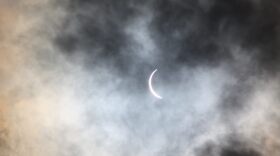Prior to Monday’s solar eclipse, we talked to an Oregon State University researcher about how the event might affect the world’s largest mass migration. KLCC’s Brian Bull has an update.
Every night, small animals called zooplankton come up from the ocean depths to feed.
Jon Fram of OSU’s College of Earth, Ocean, and Atmosphere Sciences says they expected the eclipse to trick the marine critters into an early dinnertime. Now several ocean sensors in Newport and Grays Harbor, Washington are showing them just what happened.
“So they did it! The zooplankton migrated during the eclipse. Not just during totality but through the whole partial eclipse time. So they started coming upwards for about an hour, then right after totality, they started going back down…about 80 meters.”
BULL: Well, I hope the little guys weren’t too disappointed.
(Fram laughs)

The rise of the zooplankton during an eclipse reinforces similar research done in the 1950s and 70s. Fram says monitoring technology has advanced in that time, so results should be more accurate and complete.
As for the zooplankton’s false alarm, no worries. Fram says they came back later at their regular time to feed.
Copyright 2017, KLCC.








